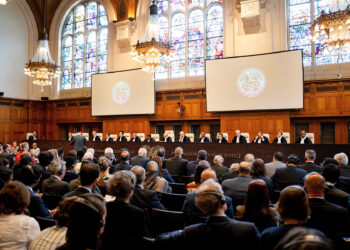Judge Hassan Farid El-Shami, head of Circuit No. 5 of the Cairo Criminal Court, is implicated in the abuse of political opponents, human rights lawyers, and civil society activists since 2013. Judge Farid sentenced dozens of Egyptians to death following a series of mass trials that lacked any semblance of due process and delivered hundreds of lengthy prison sentences to democracy and civil society activists in politically-charged court verdicts.
"The blatant disregard for the political rights and human life of Egyptians exhibited by Judge Farid has made him a key tool of President El-Sisi following the 2013 military coup in Egypt," said Jon Hoffman, Research Director for Democracy for the Arab World Now (DAWN). "An agent of state repression, Judge Farid has carried out some of the most atrocious human rights violations in Egypt while targeting political opponents on behalf of El-Sisi's government."
Judge Farid presided over the notorious the "Dispersal of the Rabaa Al-Adawiya Sit-in Case" (also called the "Rabaa Case") in 2015, following mass arrests of at least 800 Egyptians, most of whom participated in a sit-in at Rabaa Square to protest President El-Sisi's military coup on July 3, 2013. Egyptian security forces forcibly dispersed the sit-in, attacking the over 85,000 protesters assembled at Rabaa Square, and killed at least 1,036 protesters, including women and children, on August 14, 2013, resulting in what is now popularly referred to as the "Rabaa Massacre." The United Nations condemned the forcible dispersal of protesters at Rabaa Square, and an investigation by Human Rights Watch classified the massacre as a crime against humanity. No members of the Egyptian security forces faced legal accountability for the massacre.
Rather than prosecute government security forces responsible for the massacre, in 2018, the Cairo Criminal Terrorism Court, headed by Judge Hassan Farid El-Shami, sentenced 75 of the defendants in the Rabaa Case to death, 47 to life imprisonment, 374 to 15 years imprisonment, 22 to 10 years imprisonment, and 215 to five years imprisonment in a mass trial of 739 Egyptians. DAWN previously profiled several of the individuals sentenced during this mass trial. The trial witnessed a blatant disregard for legal, due process, with defendants accused of vague and sweeping charges – ranging from planning and participating in an illegal assembly; joining an illegal group; as well as participating in violence and committing murder – coupled with no individual culpability presented for the 739 sentenced. Egyptian authorities deprived defendants of the right to adequate counsel with rare and limited meetings with their lawyers, and only approved only 50-60 witnesses of the 230-240 requested by the defense. Defendants also reported being tortured by Egyptian security forces and denial of medical care while detained.
Judge Farid presided over a number of other high-profile cases that were similarly rife with abuses.
In 2015, Judge Farid sentenced prominent human rights activist Alaa Abdel Fattah to five years in prison, coupled with a $13,000 fine, under the charges of participating in an unauthorized demonstration in 2013. Alaa, an Egyptian blogger, software engineer, and political activist, originally received a sentence of 15 years and then, upon retrial, received a sentence of five years imprisonment and an order subjecting him to government surveillance following his release. A source familiar with the case told DAWN in an interview that Alaa was not present at this demonstration, and Egyptian authorities later arrested him at his home.
Released on parole in March 2019, Egyptian authorities arrested Alaa again shortly thereafter in September and transferred him to the notorious Tora maximum security prison, where he was tortured. In 2020, Judge Farid added Alaa and almost 30 others to Egypt's terrorism watch list over accusations that they joined the Muslim Brotherhood. Later, in 2021, a different judge, Moataz Sadek, sentenced Alaa to five years in prison for " joining an illegal organization, receiving foreign funding, spreading false news, and "misusing social media." President El-Sisi ratified his sentence. The verdict cannot be appealed. Despite obtaining UK citizenship while detained in 2022, and continued international outcry for his release, Alaa remains imprisoned.
Judge Farid also presided over the "Marriott Case" in June 2014, during which he sentenced three Al Jazeera journalists, arrested while staying at Cairo's Marriott Hotel in December 2013, to three years imprisonment in a maximum security prison for the "defamation of Egypt" and using "unlicensed equipment" to do so. These three journalists – Peter Greste, Mohamed Fahmy, and Baher Mohamed – received their sentence alongside three other journalists convicted in absentia. Judge Farid also accused both Mohamed Fahmy and Baher Mohamed of belonging to the Muslim Brotherhood. Egyptian authorities arrested three university students in January 2014 – Sohaib Saad, Khaled Abdel Raouf, and Shadi Abdel Hamid – and tried them alongside the three journalists for allegedly providing the journalists with video footage of protests and their alleged involvement in a "terrorist organization," referring to the Brotherhood. Judge Farid sentenced the students to three years imprisonment each.
The trial drew international condemnation for its blatant violations of due process, namely the presentation of irrelevant and intelligible evidence, prevention of sharing evidence with defense lawyers, and the retraction of key claims made by state "experts" against the accused. Additionally, the prosecution presented filmed evidence they attributed to the detained journalists, but that was produced by news organizations other than Al Jazeera. Amidst international condemnation, El-Sisi later pardoned Mohamed Fahmy and Baher Mohamed, and deported Greste.
Another trial led by Judge Farid followed the assassination of former Prosecutor General Hisham Barakat in 2015. Barakat, who is responsible for persecuting hundreds of Muslim Brotherhood members following the 2013 military coup in Egypt, died following a car bomb explosion targeting him near his house in Heliopolis. Judge Farid sentenced 31 Egyptians to death of the 67 charged for their alleged part in the assassination of Barakat. During the trial, Farid refused to acknowledge or investigate allegations of torture raised by several of the defendants. One of the defendants, Mahmoud Al-Ahmadi, executed in February 2019, testified during the trial that he signed a confession admitting to killing Barakat only after being severely tortured. Judge Farid outright dismissed these accusations of torture.
"Judge Farid and his corrupt rulings and practices embody the wider undermining of judicial legitimacy that has occurred under El-Sisi," said Hoffman. "Respect for human, political, and legal rights are completely absent in Egypt, and judges like Farid are critical to El-Sisi's repression of political opponents inside the country."
Born in 1955, Judge Farid acquired a bachelor's degree in law in 1979, and began his legal career as an agent of the Public Prosecutor in Port Said Governorate. Later, he assumed the presidency of the Criminal Court of Banha, and then head of the Criminal Department in Ismailia Governorate. After that, he rose to head of the Tanta Criminal Circuit, then president of the Cairo Court of Appeal, and then head of Circuit 28 of the Cairo Criminal Court. Judge Farid assumed his current position, head of Circuit No. 5 of the Cairo Criminal Court, in November 2019.
DAWN urges the United States to sanction Judge Hassan Farid for his role in the persecution of political activists inside Egypt. DAWN also urges the United States to end arms sales and military support to Egypt, pursuant to U.S. laws, in light of the country's widespread and systematic human rights abuses.
About DAWN's culprit gallery:
Tyrants need enablers who will implement their oppressive practices, even if it means abusing their fellow citizens. These agents often mask their complicity in the guise of professionals exercising their duties in offices, courtrooms, police stations, and interrogation rooms.
DAWN seeks to disclose the identity of the state agents who enable repression and to make them recognizable at home and abroad. These individuals, whom DAWN calls "culprits," bear administrative, civil, moral, legal, or political responsibility for human rights abuses or international humanitarian law violations.







